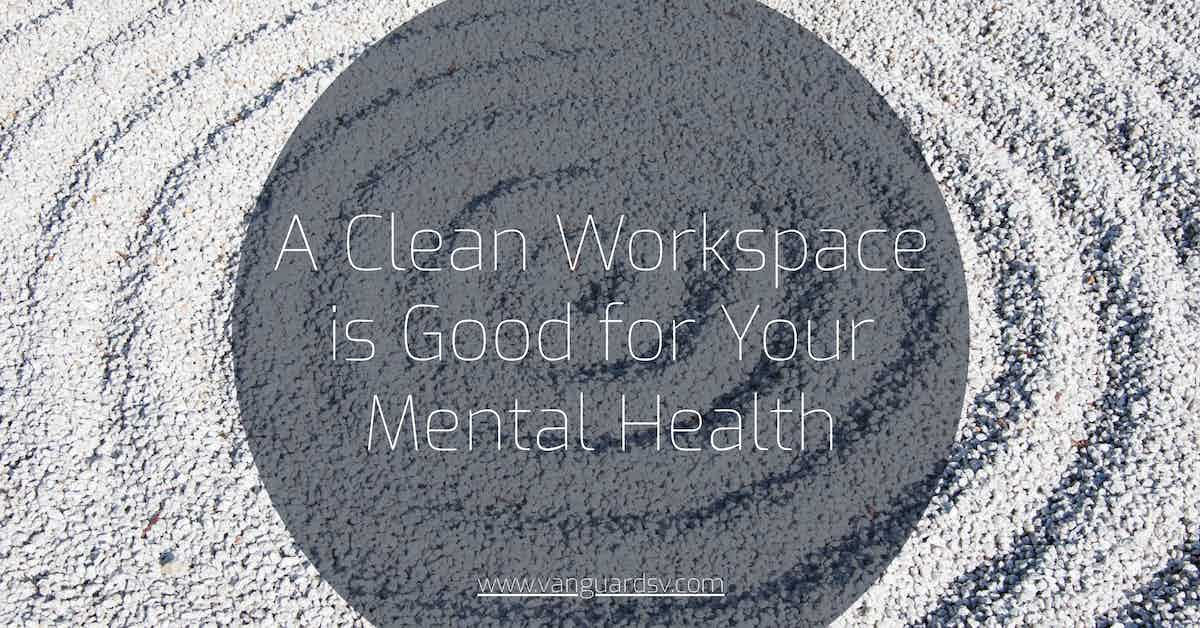A growing number of studies have established a strong correlation between workplace cleanliness, occupant wellbeing, and workforce productivity.

The Impact of Stress and Employee Mental Wellbeing in the Workplace
Data gathered by mental health experts establish a strong connection between workforce mental health challenges and significant reductions in workplace productivity, resulting in billions of dollars in annual losses to the U.S. economy.
Common symptoms of workplace depression and anxiety include:
- High or increasing rates of absenteeism.
- Issues meeting productivity targets.
- High turnover rates, and;
- Discussions regarding stress and other mental health issues among employees.
Increasingly, health officials recognize how worker mental health and workplace stress impact physical health, often negatively manifesting as:
- Hypertension.
- Burn out.
- Diabetes, and;
- Cardiovascular issues.
Additionally, the combination of increasing levels of employee stress and poor mental health has resulted in high worldwide workforce dropout rates.
According to the U.S. National Institute on Health:
Data from different countries around the world indicate that mental health problems are a cause of a number of employees dropping out of work. In the Netherlands, around 58% of the work-related disabilities are related to mental health.
In the UK, it is estimated that around 30–40% of the sickness absence is attributable to some form of mental illness.
Workplace Mental Health Risk Factors and Costs
According to the World Health Organization, a major risk factor resulting in poor workforce mental health is inadequate health and safety policies resulting in global productivity reductions of more than $1T annually, as well as mental, physical, and emotional health issues associated with unemployment and depression.
Globally, an estimated 264 million people suffer from depression, one of the leading causes of disability, with many of these people also suffering from symptoms of anxiety.
A recent WHO-led study estimates that depression and anxiety disorders cost the global economy US$ 1 trillion each year in lost productivity.
Unemployment is a well-recognized risk factor for mental health problems, while returning to, or getting work is protective.
A negative working environment may lead to physical and mental health problems, harmful use of substances or alcohol, absenteeism and lost productivity.
Workplaces that promote mental health and support people with mental disorders are more likely to reduce absenteeism, increase productivity and benefit from associated economic gains.
The Case for a Clean Desk
A clean, safe, hygienic workspace and workplace have a demonstrably positive impact on workforce mental and physical health, which corresponds directly to increases in productive output for everyone.
Regular cleaning:
- Promotes the overall physical health of all facility occupants and guests.
- Promotes a strong corporate image, which provides employees with a much-needed morale boost.
- Corresponds to increases in employee happiness and job satisfaction.
- Contributes to measurable improvements in occupant performance.
- Reduces occupant stress, enhances their mood and improves their positivity.
According to the Harvard Business Review;
Regularly tidying your workspace, rather than letting things accumulate, is the tried and true way to keep the clutter at bay.
Avoid letting things get so bad that you start cleaning as a form of procrastination.
For teams and organizations, establish regular “spring cleaning” days with pizza can create social interaction and support around a task that most people don’t enjoy (Marie Kondo aside).
Consider instituting a clean-desk policy to govern the tidiness of shared work spaces.
Work with your IT team to provide support for employees in the form of tools to manage online documents, as well as clarity on what should be kept and what can be discarded.
In doing so, organizations need to strike a balance between practical and security considerations, and keep in mind employees’ need for self-identity and autonomy.
References & Resources
- What Employers Need to Know About Mental Health in the Workplace
- Why a Clean Workspace is Good for Your Mental Health
- 5 Mental Health Benefits of a Clean and Organized Workspace
- How cleanliness impacts your workplace
Takeaway
Clutter and the absence of workplace cleanliness and hygiene negatively impact workforce mental wellbeing, physical health, and workplace productivity.
According to CloudEmployee;
Studies have found that, along with the workload, a messy workstation not only hinders an individual’s productivity but also negatively affects the mood and resilience of a person.
According to self-improvement website Pick the Brain, cluttered spaces can provoke emotional and mental distress, as people feel like they no longer have control over their space and, therefore, their lives.
The National Association of Professional Organisations finds paper clutter to be the number one issue that adds to stress and frustration in the workplace.
According to this study, people spend around 4.3 hours rummaging through papers per week.
Meaning that a cluttered desk wastes your time on trivial and insignificant tasks like sorting through your files, ultimately harming your efficiency at work and leaving you unproductive and stressed.
Outsourcing is a proven method for onboarding highly in-demand cleaning and disinfection services and experience for a fraction of the price of maintaining a similar service in-house.
If you would like more information regarding the effectiveness of high-performance infection prevention and control measures, or if you would like to schedule a free, no-obligation on-site assessment of your facility's custodial needs, contact us today for a free quote!
In Bakersfield, CA, call (661) 437-3253
In Fresno, CA, call (559) 206-1059
In Valencia, CA, or Santa Clarita, CA, call (661) 437-3253
In Palmdale, CA, or Lancaster, CA, call (661) 371-4756

